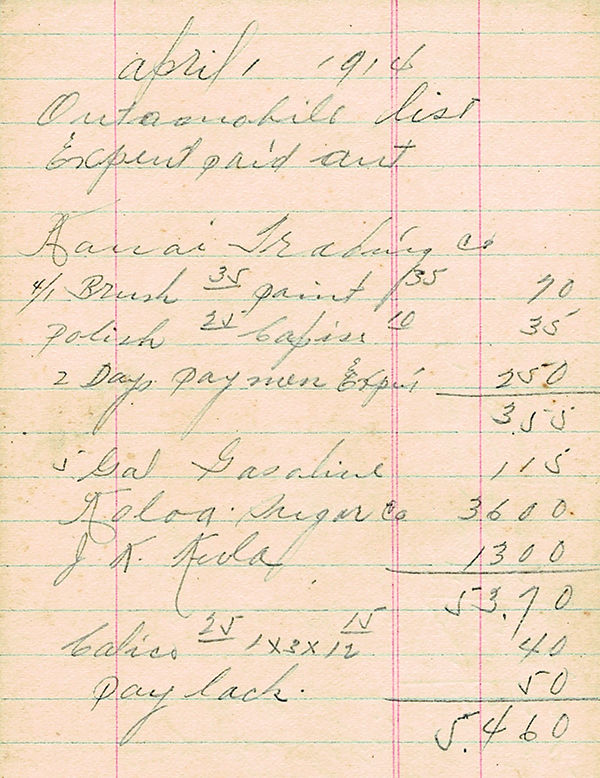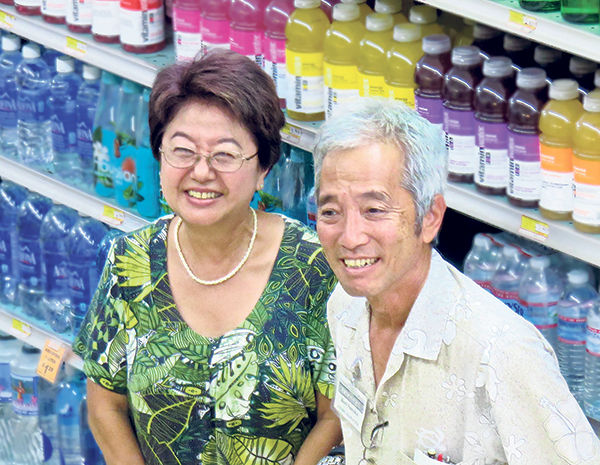Walking through Sueoka Store in downtown Koloa on Kauai’s South Shore is simultaneously an experience in modern grocery shopping and a flashback to the sweetness of the Garden Island in the 1930s and 1940s, when you knew the owners of
Walking through Sueoka Store in downtown Koloa on Kauai’s South Shore is simultaneously an experience in modern grocery shopping and a flashback to the sweetness of the Garden Island in the 1930s and 1940s, when you knew the owners of all the stores in town and they knew you.
Instantly, you feel connected with generations of people who have shopped in this store since it was established in 1918 by a Japanese immigrant who wanted to provide a better life for his wife and children than was possible on his sugar plantation wages.
Today, Sueoka Store is run by founder Mankichi Sueoka’s grandchildren, Rod Sueoka and Rod’s cousin Wendy Kawaguchi, with a helping hand from Rod’s mother, Betty Miyazaki.
Most days you can find all three working from the tiny second floor office that overlooks the cash registers at the front of the bustling store.
But don’t be surprised if you see Rod or Wendy bagging groceries or Betty giving directions to a customer who seems a bit lost walking the aisles. It’s second nature for them to help wherever needed.
More than a store
“Our store is more than a grocery store. Everybody here is like family,” Wendy says. “Some of our employees have seen our customers from the time they were little kids to now that they’re grown and have children of their own.”
Betty, 90, started working at the store when she was 21 years old after marrying into the Sueoka family. “When I see some customers, I still think of them as kids,” she says with a laugh.
Family ties have always set Sueoka Store apart as each new generation has willingly stepped into their role when they were called.
After college, Rod had been working in a small market owned by a friend of his father’s in Waikiki, when his uncle called and asked him to come home to work at Sueoka Store. “It was family, so I agreed,” Rod says.
Wendy had also been living and working on Oahu when her mother retired from the store. “The family called me and asked if I would come home and help out in the office,” she says. “This is family. You say, ‘Sure, I’ll be on the next plane.’”
As the only locally owned grocery story left in Koloa, Rod says Sueoka Store attracts people who come from the Mainland trying to find their families or their roots.
“Some of them grew up here but they haven’t been here for 30, 40, 50 years,” Rod says. “They remember us. Sometimes they bring us photographs and ask us if we know their family.”
Betty can usually help. “If you tell me their names, I’ll tell you where they used to live,” she says.
Based on trust
In 1918, when Mankichi Sueoka first came up with the idea to open a store, the bank wouldn’t lend him money because he was struggling financially. Fortuitously, his tanomoshi group loaned him the funds.
“A tanomoshi group is a Japanese custom that helps neighbors or friends support one another,” Wendy says. “Every month when you get your paycheck, you put in, say, $20 and it goes into sort of a kitty. The money can be lent to whomever needs it the most. It’s all based on trust.”
With this loan, Mankichi opened his first Sueoka Store inside “Japanese Camp,” a settlement of single-walled wooden homes where sugar plantation employees, primarily other Japanese immigrants, lived. Customers were allowed to sign for their goods on credit and come in on payday to clear their debt.
“In the beginning it was really hard for my grandparents,” Wendy says. “The customers were laborers in the sugar plantations. Sometimes they didn’t have enough money to pay for all their goods.”
So when the store moved to its current location in 1933 in the heart of Koloa, Mankichi put up a big sign that said, “SUEOKA CASH STORE,” letting people know they could pay only with cash, no longer by simply signing their name.
Years later, when Wendy’s mother took over accounting for the store, she began extending in-store credit again. “Every month my mom had to hand out payment slips to everyone and collect all of those credits,” Wendy says. “Every month there would be a line of men waiting to pay their bills.”
After Wendy began handling the store’s accounts, they began accepting credit cards, so they discontinued in-store credit.
“I recently found the original SUEOKA CASH STORE sign in storage, cleaned it up and hung it on the ceiling above our cashiers,” Wendy says. “When visitors see the sign, they sometimes ask if we still only take cash!”
Go that little extra mile
Wendy acknowledges that it’s impossible for Sueoka Store to compete with larger stores, “but as far as customer service, perhaps we can go that little extra mile,” she says. When Rod realized that many Filipino families enjoy homemade food for parties, he created an Asian section in the store featuring noodles, sauces, rice and spices that are popular in Filipino cooking. “People come all the way from Kapaa to pick up their supplies,” Wendy says. “Hotels and restaurants sometimes buy from us when they run out, too, so we’re lucky.”
Around 1980, they opened the popular Sueoka Snack Shop where local favorites such as kalua pork, fish burgers, teriyaki burgers and loco moco can be ordered from a walk-up window along the side of the building. The scents wafting through the parking lot instantly trigger hunger.
“Kids come home from college and they’ve got to eat there,” Wendy says.
Much of the store’s produce is now locally grown, and Sueoka Store has been known for its freshly butchered meats for decades.
In the 1930s and 1940s, Betty’s former husband, George Sueoka, was the butcher, slaughtering all the cows and pigs for the market. Rod recalls that it was out of the norm to have a father who was a butcher; most of his classmates’ parents worked for the sugar plantations.
“Everybody else’s parent was a truck driver, mill worker or field worker, and everybody else lived in a plantation camp,” he says. “But it was good. My dad didn’t go to war because he was the only butcher in town so he didn’t get drafted.”
Trying our best
Everyone at Sueoka Store works together to keep the balance between the personalized service of a family-owned market with the wants and desires of today’s customers.
“We try to keep it as local as possible, following my grandfather’s philosophy,” Wendy says. “When I was younger, some of the older ladies would come shopping here and they would say, ‘You know, your grandfather would make deliveries all the way to Puhi with his horse and buggy. He was such a nice man.’
“We are trying our best to live up to whatever our grandparents did that was so wonderful.”
•••
Pamela Varma Brown is the publisher of “Kauai Stories,” and the forthcoming “Kauai Stories 2,” which includes a more detailed version of the Sueoka Store story.




